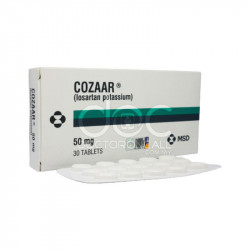Cozaar (losartan) Coupons, Discounts & Cost
Cozaar (losartan potassium) belongs to the class of drugs called angiotensin II receptor blockers. One way to save money on the Cozaar (losartan) retail cost regardless of income and insurance status is to use Cozaar (losartan) coupons or discount cards from RXCoupons. Use our Cozaar (losartan) coupons at your online pharmacy and receive up to 75% off the sale price each time you refill your prescription.
What is Cozaar (losartan)?
Cozaar (losartan potassium) belongs to the class of drugs called angiotensin II receptor blockers. The drug is used to treat high blood pressure (hypertension).
Cozaar (losartan) indications for use
Cozaar (losartan potassium) is used for the treatment of hypertension, chronic heart failure, proteinuria (associated with type 2 diabetes), arterial hypertension and left ventricular hypertrophy (to reduce the risk of stroke, myocardial infarction and sudden cardiac death).
Cozaar (losartan) contraindications
- Pregnancy and breastfeeding; - Age up to 18 years; - Hypersensitivity to the drug.
Caution is recommended in patients with kidney and/or liver disease, patients with decreased circulating blood volume (including therapy with diuretics in high doses).
The drug is strictly prohibited during pregnancy. Pregnant women should choose other antihypertensive drugs.
Breastfeeding should be stopped during treatment with Cozaar.
Cozaar (losartan) dosage and administration
Cozaar (losartan potassium) tablets are taken once daily, at any time, regardless of the meal. The dose of medication should be based on clinical indications.
The recommended dosage of Cozaar (losartan potassium):
Arterial hypertension: 50 mg as initial and maintenance dose (100 mg if necessary). Patients with BCC should start with a dose of 25 mg. Patients with liver disease should reduce the dose. Elderly patients with renal failure (including patients on dialysis) may not change the starting dose.
Chronic heart failure: initial dose - 12,5 mg. The dose may be increased 1 time per week, up to 25 or 50 mg.
Type 2 diabetes mellitus with proteinuria: the initial dose is 50 mg. The dose should be gradually increased to 100 mg. The drug can be combined with diuretics, alpha and beta blockers, calcium channel blockers, other hypoglycemic agents (thiazolidinediones, sulfonylureas, alpha-glucosidase inhibitors) and insulin.
Arterial hypertension and left ventricular hypertrophy: the initial dose is 50 mg. The dose should be gradually increased to 100 mg.
Cozaar (losartan) side effects
The following side effects occur while taking Cozaar (losartan potassium): Cardiovascular system: tachycardia, palpitations. Respiratory system: edema of the nasal mucosa, cough, infections of the upper respiratory tract, pharyngitis, sinusitis. Digestive system: nausea, dyspepsia, diarrhea. Nervous system: insomnia, headache, dizziness. Musculoskeletal system: muscle cramps, back pain. Other disorders: fatigue, weakness, chest pain, pain in the stomach, swelling, hyperkalemia. Adverse drug reactions in clinical practice: Digestive system: liver disease symptoms, hepatitis. Hematopoietic system: thrombocytopenia, anemia. Musculoskeletal system: arthralgia, myalgia, rhabdomyolysis. Nervous system: migraine, dysgeusia. Respiratory system: cough. Dermatological reactions: itching, rash, skin redness. Allergic reactions: vasculitis, angioedema, swelling of the lips, face, tongue. In general, Cozaar is well tolerated. Most side effects are mild and don't last long.
Cozaar (losartan): special instructions
Cozaar (losartan potassium) therapy may cause angioedema in patients with hypersensitivity to the drug.
Patients with renal failure should be particularly careful while taking Cozaar (both in persons with or without diabetes). The drug should be used at a lower dose.
The drug can cause azotemia, oliguria and acute renal failure in patients with severe chronic heart failure. Cozaar therapy does not need dose adjustment in elderly patients.
Potassium supplements, triamterene, spironolactone, amiloride and other drugs that prevent the formation of angiotensin II can increase the level of potassium in the blood.
NSAIDs may reduce the antihypertensive effect of the drug.

